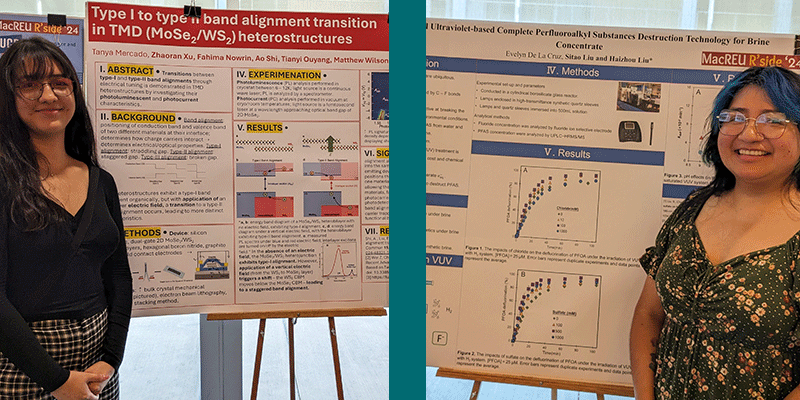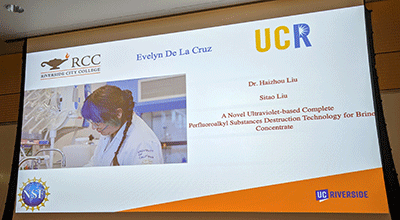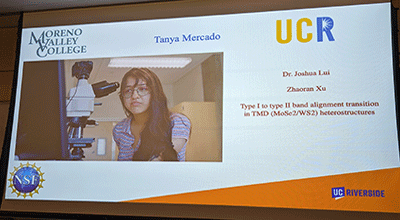Students Participate in the MacREU Program at the University of California, Riverside
09/04/2024

Moreno Valley College had three students selected to participate in the MacREU Program at the University of California, Riverside. Two of the students conducted independent research with Joanna Werner-Fraczek, Ph.D., professor of Biology, in spring 2024 in collaboration with Giulia Scarparo, Ph.D., from the Department of Entomology at University of California, Riverside. Another student studied under Tyrone Hogenauer, Ph.D. assistant professor, Chemistry at Moreno Valley College.
MacREU provides paid research opportunities in Materials Science & Engineering from mid-June to mid-August thanks to support from the National Science Foundation and the Bourns College of Engineering at UC Riverside. The program brings together undergraduate students from community colleges and four-year universities as well as research universities each summer at UC Riverside. Each year, research projects are related to the growth, characterization, and application of thin films or monolayer materials. Students from a broad spectrum of backgrounds in the physical sciences or engineering.

Evelyn De La Cruz focused on water chemistry and technology.
“The graduate student I worked under is doing his research on a new treatment system that utilizes UV light to destroy PFAS in waste brine,” De La Cruz said. “Three months ago, I did not think I would ever step foot into something like this research. Although I was hesitant at the start, I was curious about what a real research lab looked like. I barely had an inkling of what graduate programs looked like and no desire to attend any after my bachelor's. I did not even think of myself as capable of participating in research as an undergrad.”
De La Cruz said, his mentor “trained me on how to calibrate an ISE meter, create synthetic brine solutions, run the experiment alone, and prepare samples for analysis in an LC-MS/MS machine. I also gained insight into professional development from faculty who have decades of expertise in their respective fields. I was awestruck.”
De La Cruz, who plans to attend graduate school for public health, added “my perspective on my capabilities, both academic and professional, has become overwhelmingly positive. I can now say I have presented research and have lab experience under my belt. This program has propelled me to a future I cannot wait to grasp. I am invigorated and changed for the better in more ways than one. I would not have spent my summer any other way.”

Tanya Mercado, an engineering major, participated in revolved around two-dimensional transition
metal dichalcogenide semiconductors and the measuring of their electron band gap alignment
using ultrafast laser spectroscopy.
“Don’t fret, I still don’t know what most of those words mean,” she joked. “The point of this summer research experience was not to become an expert in the field of materials science but get a behind the scenes glimpse at what it's like to actually work in a graduate school lab.”
Mercado said, she really enjoyed meeting different people from different countries; the brilliantness of the individuals in the program; and the chance to expand her knowledge.
Ultimately, she discovered with her passion lies.
“I got a first-hand experience at what it is like to be a professional,” she said. “The professional world feels as though this entire other side of the planet has existed all this time, and I was never aware of it. Regardless of whether I was ready for this grand of a change or not, it’s here and I am looking forward to what comes next.”
Luciano Ponce worked on the development of CRISPR systems.
“The work has revolutionized advancements in genome editing,” he said. “Specifically,
the CRISPR dCas12a system, which can precisely bind to specific DNA targets without
double-stranded DNA breaks, has allowed a plethora of genomic manipulation applications,
including gene repression and gene upregulation.”
He and his team created a CRISPR dCas12a platform using a split intein tag to facilitate inducible spatiotemporal control of accurate genome targeting.
“Our approach involved generating ten split dCas12a pairs using molecular engineering tools. We evaluated their efficacy by assessing the fluorescence intensity of eGFP biomarkers in bacterial cells,” Ponce said. “Our results indicated that several split dCas12a variants demonstrated significantly lower fluorescence intensity than their control counterparts, showcasing their reliable binding to target DNA and potent transcriptional repression abilities. This platform has the potential to be integrated into CRISPR libraries and be further engineered for optimized use in a variety of platforms, such as accurate biosensors and precise inducible transcriptional modifiers.”
Each of the students were cited by Ludwig Barteles, Ph.D., professor of Chemistry
and director of MacREU at the university.
“Seeing our students present their research and testify to what the experience meant
for them was a great pleasure,” Werner-Fraczek said.
Individuals interested in next year’s summer program can submit an application online.
Published by External Relations & Strategic Communications

